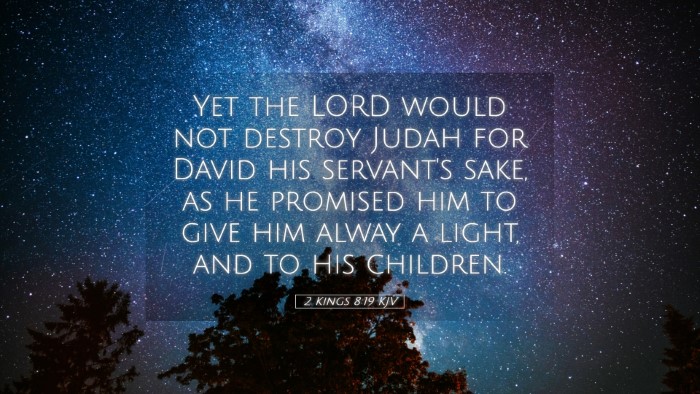Commentary on 2 Kings 8:19
2 Kings 8:19 states: "Yet the LORD would not destroy Judah for David his servant's sake, as he promised him to give him always a light, and to his children." This verse serves as a poignant reminder of God's faithful covenant and His unwavering commitment to His people, even amidst their failures.
Contextual Overview
This passage occurs within a broader narrative concerning the kingdom of Judah during a tumultuous period marked by political strife, idolatry, and moral decay. At this time, the leadership in both Israel and Judah frequently strayed from God’s directives, resulting in dire consequences. However, God’s promise to David serves as a foundational element in the preservation of Judah.
Theological Significance
The verse encapsulates several crucial theological themes: covenant fidelity, divine mercy, and the significance of righteous leadership.
- Covenant Fidelity: The promise mentioned in the verse underscores the enduring nature of God's covenants. As Matthew Henry notes, God's covenant with David assures that Judah would not face total obliteration due to God's faithfulness to His word.
- Divine Mercy: Albert Barnes emphasizes that God's mercy prevails even in rebellion. He interprets this verse as a testament to God's grace, indicating that the intercessory position of His faithful servant, David, shielded Judah from utter destruction.
- Righteous Leadership: Adam Clarke points out that the legacy of David's righteousness continues to influence the nation, suggesting a theological principle that leaders' lives affect their people's destiny. David's unwavering faithfulness to God serves as a conduit for mercy to flow to his descendants.
Insights from Public Domain Commentaries
Matthew Henry's Commentary
Matthew Henry reflects on the faithfulness of God despite the unfaithfulness of His people, stating: "God will not utterly cast off His people because of the sin of leaders, provided there are those who uphold righteousness." He articulates that Judah’s forgiveness and preservation stem from the established covenant with David, reinforcing the idea that divine judgment is moderated by grace. Henry calls attention to God's nature as one who is "slow to anger" and rich in mercy, which aligns with the overarching themes of redemption inherent throughout Scripture.
Albert Barnes' Notes on the Bible
Barnes highlights the profound mercy exhibited in this passage. He notes: "The relation of the king to David is emphasized as a reason for sparing Judah, illustrating the principle that God honors His promises to the patriarchs." This insight emphasizes the importance of historical faithfulness and the power of intercessory prayer, likening David as a type of Christ who stands in the gap between divine judgment and mercy.
Adam Clarke’s Commentary
Clarke elaborates that the preservation of Judah serves as a crucial demonstration of providence as it relates to divine sovereignty over national destinies. He states: "Judah’s survival amidst calamity is not merely a function of its political situation, but rather the fulfillment of God's will to maintain a remnant for His purpose through the lineage of David." He encourages readers to consider the implications of God maintaining His promises throughout generations, offering hope that resonates with the potential for restoration and renewal.
Practical Applications
This verse and its commentary yield several significant implications for modern readers, particularly for pastors, theologians, and students of the Bible:
- Encouragement in Leadership: The importance of righteous leadership is paramount. This passage serves as a reminder for those in positions of authority to nurture their spiritual standing, knowing it affects those they lead.
- The Power of Intercession: The passage underlines the role of intercessory prayer in affecting change. Believers are encouraged to pray earnestly for their communities and nations, following David's example of faithfulness.
- Hope in God’s Promises: Just as God honored His covenant with David, individuals can take comfort knowing that God's promises endure, providing hope in times of distress and uncertainty.
- Reflection on God’s Mercy: The character of God as compassionate and merciful invites believers to reflect on their lives, encouraging a response of gratitude, repentance, and reverence.
Conclusion
In conclusion, 2 Kings 8:19 serves as a powerful testimony to God’s unbreakable covenant, His abundant mercy, and the significant impact of righteous leadership. Through the insights of commentators like Matthew Henry, Albert Barnes, and Adam Clarke, we glean a deeper understanding of these principles, which resonate profoundly within the life of the contemporary believer. As such, it calls all God's people—pastors, theologians, and laymen alike—to embrace the lessons of faithfulness, intercession, and the hope that comes through God’s immutable promises.


